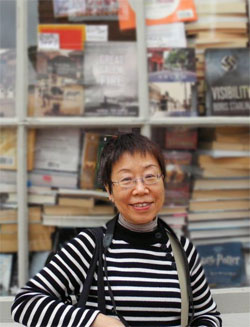- ABOUT IHSSABOUT IHSS
- PEOPLE
- NEWS & EVENTSNEWS & EVENTS
- RESEARCHRESEARCH
- FELLOWSHIPS & GRANTSFELLOWSHIPS & GRANTS
- TEACHING & LEARNINGTEACHING & LEARNING
- PUBLICATIONSPUBLICATIONS

Professor Angela Ki Che Leung has obtained grant from General Research Fund (GRF 2013 – 14) for her project The construction of nutritional knowledge in modern China (ca.1850 – 1950). The grant, valued at HK$ 731,500 over three years, is funded by the Research Grants Council (RGC).
Abstract of Research:
Nutritional science demonstrates how “Western” science merged with the process of modern Chinese state building. Evolving from biochemical research conducted in Europe and colonial Asia from the late 19th to the early 20th centuries, this cutting-edge research field developed new ideas such as “malnutrition” which were applied to the ignorant poor and indigenous populations in European colonies. In China, the new science coined the term “nutrition” (yingyang 營養) as a scientific concept at the turn of the century. This new science had great appeal to both political and intellectual elites and became firmly institutionalized in Republican China in the 1920s and 1930s with “Western” trained experts taking up bureaucratic and academic positions in government and major universities, hospitals, and research institutes including those in the military. The grand project of improving the Chinese race was now articulated on policies to improve national health by reforming popular dietary habits.
The projects examines three related historical process of the construction of nutritional knowledge and its implementation in modern China: first, the development and characteristics (as compared to the research focus in Europe) of biochemical nutritional science in China; second, the roles of relevant institutions and of key intellectuals and bureaucratic involved in the research and application of the science; third, reception of the new science by society at large as revealed in modern “life-nurturing” (yangsheng 養生) and “dietetic medical” (shiliao 食療) based on old Chinese dietetic traditions, popular literature on nutrition (yingyang), and the work of popular writers who promoted hybrid dietetic practices based on traditional and new ideas. Special attention will be paid to regional differences, with emphasis on South China, including Hong Kong. The project will also examine the changing production and consumption of a few key foods controversial in nutritional debates, such as white rice, sugar, tea, milk etc., and the public discussions on indigenous habits such as vegetarianism that would best articulate changing nutritional precepts on terms of bodily practice and national health promotion.
The study of the multi-layered process of nutritional knowledge construction and its implementation in this period, within and outside of public networks, and by different historical actors, will capture with precision the complexity of China’s quest for modernity in new light. It will also provide a useful and productive perspective for assessing the broad social engineering project of the modern Chinese state captivated by the idea of “science”.

Professor Angela Ki Che Leung has obtained grant from General Research Fund (GRF 2013 – 14) for her project The construction of nutritional knowledge in modern China (ca.1850 – 1950). The grant, valued at HK$ 731,500 over three years, is funded by the Research Grants Council (RGC).
Abstract of Research:
Nutritional science demonstrates how “Western” science merged with the process of modern Chinese state building. Evolving from biochemical research conducted in Europe and colonial Asia from the late 19th to the early 20th centuries, this cutting-edge research field developed new ideas such as “malnutrition” which were applied to the ignorant poor and indigenous populations in European colonies. In China, the new science coined the term “nutrition” (yingyang 營養) as a scientific concept at the turn of the century. This new science had great appeal to both political and intellectual elites and became firmly institutionalized in Republican China in the 1920s and 1930s with “Western” trained experts taking up bureaucratic and academic positions in government and major universities, hospitals, and research institutes including those in the military. The grand project of improving the Chinese race was now articulated on policies to improve national health by reforming popular dietary habits.
The projects examines three related historical process of the construction of nutritional knowledge and its implementation in modern China: first, the development and characteristics (as compared to the research focus in Europe) of biochemical nutritional science in China; second, the roles of relevant institutions and of key intellectuals and bureaucratic involved in the research and application of the science; third, reception of the new science by society at large as revealed in modern “life-nurturing” (yangsheng 養生) and “dietetic medical” (shiliao 食療) based on old Chinese dietetic traditions, popular literature on nutrition (yingyang), and the work of popular writers who promoted hybrid dietetic practices based on traditional and new ideas. Special attention will be paid to regional differences, with emphasis on South China, including Hong Kong. The project will also examine the changing production and consumption of a few key foods controversial in nutritional debates, such as white rice, sugar, tea, milk etc., and the public discussions on indigenous habits such as vegetarianism that would best articulate changing nutritional precepts on terms of bodily practice and national health promotion.
The study of the multi-layered process of nutritional knowledge construction and its implementation in this period, within and outside of public networks, and by different historical actors, will capture with precision the complexity of China’s quest for modernity in new light. It will also provide a useful and productive perspective for assessing the broad social engineering project of the modern Chinese state captivated by the idea of “science”.
Copyright © 2025 Hong Kong Institute for the Humanities and Social Sciences, The University of Hong Kong. All Rights Reserved.